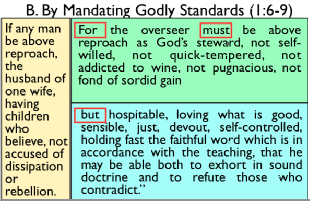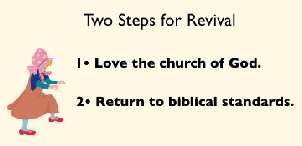“5 For this reason I left you in Crete, that you might set in order what remains, and appoint elders in every city as I directed you, 6 namely, if any man be above reproach, the husband of one wife, having children who believe, not accused of dissipation or rebellion. 7 For the overseer must be above reproach as God’s steward, not self-willed, not quick-tempered, not addicted to wine, not pugnacious, not fond of sordid gain, 8 but hospitable, loving what is good, sensible, just, devout, self-controlled, 9 holding fast the faithful word which is in accordance with the teaching, that he may be able both to exhort in sound doctrine and to refute those who contradict.” (Titus 1:6-9)
Titus 1:6-9 Mandating Godly Standards for Church Leaders, page 4/5 of The Bible Teacher's Commentary, is an expository treatment of Titus 1:6-9 which clearly sets out Biblical standards for Christian leaders. This study includes discussion on more sensitive topics of female pastors, lack of moral standards and the implications of pastor kids (pks) who do not obey the Word. A Bible Study is included at the end.
|
The Biblical Parenting Principles shows how by consistently following God's prescription for raising up children we can all raise up good children. |
.
2. The life of leader is not to be related to his effectiveness in ministry.
Some people have gone even further. They confidently state that what a person is in his private life is not relevant to what kind of person he is in ministry. I suppose if we look through this list and reflect about two seconds, we would have to say just the opposite.
Many things don’t matter in an elder, but his character is the most important qualification for effective ministry. We should see here that this is the reason a church needs to be so careful in choosing a pastor. A stranger can hide details from the church leaders. One church was excited about their new pastor. But just a few years later they discovered that his relationship with his wife was not good. It was only then that it was discovered that he and his wife had gone through much marital counseling without effect. He seemed to be the right pastor, but he was not.
We find here a clear connection between how a man lives and the behavior of the child. The word ‘for’ in verse 7 connects and explains the former verse. We cannot prove that the ‘for’ reaches as far back as ‘one-woman man.’ I believe it does. But even if it doesn’t, it does show the link between how a person parents and the behavior of his children.
|
I believe the quality of the marriage also fully effects the behavior of the children. Children are always learning from how their parents live. They learn most through the interaction with them nd the interaction between their parents. In other words, when a person does not conduct himself rightly, the children will respond against this hypocritical life and learn from it but only in a worse style.
3. The sex of an elder or pastor does not matter.
There is much debate about gender issues in the Christian church. Many churches have gone beyond argument. They just assume it is the way they think it should be. A memorial service I recently attended had two women pastors present. Where do they get the authority to so openly go against the scriptures? If we are slack here, we will be slack in other places. If we are going by the scriptures, then we must live by the scriptures and trust God for His design. Now if we want to study to see what the scriptures really says, that is fine. This is a must. It should not have anything to do with our attitudes or prejudices but what the scriptures says.
The NASB says “If any man.” This would seem to be conclusive but the NIV uses the phrase “The elder.” The word ‘elder’ is not used at the beginning of verse 6, but it doesn’t matter. The subject from the previous verse is quite clear. But just in case it isn’t, Paul knows how to differentiate between older men and elderly women. The word elder in the original Greek language is in the masculine. This means he is referring to men rather than women. This is further substantiated by the way he immediately describes him literally as a ‘one-woman man.’ Some versions rightly use ‘husband’ though it is not as clear as the literal translation ‘one-woman man.’
We are not saying that women are not gifted to serve.  They specialize in serving and nurturing. We should encourage women to minister to others. Paul only asks them to stay out of situations where they bear authority over men. The modern church’s ordination of women is a clear mark of the demise of the church. They will not bring order but further disorder.
They specialize in serving and nurturing. We should encourage women to minister to others. Paul only asks them to stay out of situations where they bear authority over men. The modern church’s ordination of women is a clear mark of the demise of the church. They will not bring order but further disorder.
Below is a chart of each description used of the godly leader. These are standards for every Christian, but required for leadership. Start from the left and read to the right. The middle column provides the literal translation while the third column tries to put it in words and context of today’s world.
Explanation of Titus 1:6-9 Phrase by Phrase
6 Namely, if any man be above reproach, the husband of one wife, having children who believe, not accused of dissipation or rebellion. 7 For the overseer must be above reproach as God’s steward, not self-willed, not quick-tempered, not addicted to wine, not pugnacious, not fond of sordid gain, 8 but hospitable, loving what is good, sensible, just, devout, self-controlled, 9 holding fast the faithful word which is in accordance with the teaching, that he may be able both to exhort in sound doctrine and to refute those who contradict.” (Titus 1:6-9)
Each of the following darkened texts starts with the stated qualification of the Christian leader (NASB) then followed by a literal translation (sometimes does not differ much but it helps amplify the meaning) and lastly underneath by a description in the modern context.
- Be above reproach (Literal: Blameless, no accusation against) (Titus 1:6)
Fault cannot be found with him and, therefore, there is no charge against him.
- The husband of one wife (Literal: ‘one woman' man) (Titus 1:6)
Like God’s original design: one woman for one man. Rules out adultery, polygamy and remarriage (if not widower). Jesus understood remarriage (not of widow(er) as a form of adultery. “And He said to them, “Whoever divorces his wife and marries another woman commits adultery against her; and if she herself divorces her husband and marries another man, she is committing adultery” (Mark 10:11, 12).
- Having children who believe, not accused of dissipation or rebellion (Titus 1:6)
(Literal: Children who have faith; no wild living or unruly or not subject to control)
The father’s consistent testimony and training at home is proof one is ready for ministry in public.
- Above reproach as God’s steward (Literal: No charge in the way he handles his life and possessions including finances) (Titus 1:7)
People don’t even think negatively about the way he handles his finances and affairs.
- Not self-willed (Literal: Self-pleasing; focused on self) (Titus 1:7)
He seeks to help others rather than meeting his own delights and lusts.
- Not quick-tempered (Literal: Easily angered or brought to wrath) (Titus 1:7)
Controls the way he responds to others and therefore slow to anger rather than quickly angered.
- Not addicted to wine (Literal: An alcoholic; casual drinker) (Titus 1:7)
Free from influences of alcohol and other kind of drugs.
- Not pugnacious (Literal: Contentious, quarrelsome, argumentative) (Titus 1:7)
Likes people and doesn’t fight with others.
- Not fond of sordid gain (Literal: Greedy. Out for money even in dishonorable ways) (Titus 1:7)
Content with what he has and doesn’t chase after money.
- Hospitable (Literal: Generous to guests) (Titus 1:8)
Given to hospitality and likes to share what he has with others.
- Loving what is good (Literal: Loves what is good) (Titus 1:8)
Loves good things so that he purposely avoids evil whether in lifestyle or what he sees.
- Sensible (Literal: Sound mind, temperate) (Titus 1:8)
Keeps a good balance about life and his life choices.
- Just (Literal: Righteous, virtuous, passes on right judgment) (Titus 1:8)
Lives by God’s standards and treats people the way they should be treated.
- Devout (Literal: Moral, upright, what is right) (Titus 1:8)
Lives a life pleasing to God and right before man; godly.
- Self-controlled (Literal: Power over, mastering, restraining) (Titus 1:8)
He lives a pure life because he has control over his impulses and desires.
- Holding fast the faithful word which is in accordance with the teaching, that he may be able both to exhort in sound doctrine and to refute those who contradict (Literal: Holds up and defends the faith delivered so that he exhorts others with sound teaching and reprove or rebuke those who openly speak against the word. (Titus 1:9)
Deeply believes in and defends the Word of God against attacks from others including positively teaching the Word and refuting those who speak against God’s Word.
We must return to our prior question. Why does Paul largely write about character rather than organization, leadership skills or tradition? We must accept the fact that it is character quality that is most needed. Poor leaders will hurt the flock because of character flaws. A character flaw means that they indulge in some aspect of their old flesh. Satan has an inroad into their lives. The church talks lots about skill and gifting but shame on not holding its men to live by these standards.
The point is this. If we are going to find someone faithful caring for God’s people, he must faithfully care for his own wife and children. If we are going to find a person who will not allow the pursuit of wealth to interfere with his ministry to people, then he must not have an eye after wealth. There are two great dangers to those in ministry: women and wealth. Paul nips these problems right here by his high qualifications.
The apostle called Titus to the task of setting up trustworthy leaders. What kind of leaders were they to be? Were they to be humorous, educated, well-off or just clever? No. Instead, the apostle sets certain qualities for these upcoming leaders. Of course, these spiritual markers are not only for godly leaders, but for all Christians. But the leaders must live what they preach or simply don’t lead. The Gospel is inextricably related to the lives of those who profess the name of Jesus Christ. Paul describes the truth ‘according to godliness.’ If we have knowledge without transformed lives, we are a danger to the church rather than a help.
We can say much about each quality that he mentioned, but like Paul just briefly mention each one so that each person can personally reflect on his own life. But when the church sees these qualifications, she must begin to accept these standards as normal for all Christians or one will never get leaders like this. Sure, a leader like a star among darkness might arise, but he won’t stay. If we want leaders like this, then the whole congregation need to lift up their own standards. It is only this way, that these qualities will be presented, understood, taught and passed on. It is only when God’s people start loving godly things more than things of the world that the young ones will emulate them. There is far too much emphasis on becoming popular and accepted by others so that others are won to Christ.
Frankly, from all that we see here. If we have to tone down these qualities to get people in the church, then they will never want those values. It is only when we live holy lives will we attract people that God is prompting into the kingdom. Garbage attracts flies. Holiness attracts those with whom God is working.
Let me make a comment about those going into full-time ministry. We see that most people are focused on getting a seminary degree. Paul is not at all concerned with this. He is not against education, but education must be built upon a real faith and character. If the person lacks character, then they lack faith. Those that are sensing God’s hand upon their lives must not cover up their weak spots so that they can squeak into full-time service. The seminary will never find out. But satan will. This list does not only protect God’s people from those in leadership that should not be there, but also shields Christian leaders from Satan’s attacks. He knows our weakness and sets us up for a fall. This brings great damage upon the church. It is much better that we early on are frank with the leaders of the church and seek counsel so that they can see the power of God’s Word overcome those problems before moving on.
Application
• These standards are for everyone to hold by. Yes, leaders need to live by them but so does everyone.
• So where do you fail? Instead of being threatened, this is a good opportunity for us to cry out to God for repentance from the sins that we have tolerated in our lives and seek power and wisdom from the Spirit so that we would by His grace overcome. Holiness speaks of real spiritual power. Holiness allows a man to be close to God. Holiness invites God to fully work through a man.
•As families, we need to recognize that we are responsible to train character into our children. If we do not, then we are not being faithful to God’s Word. God tells us that we should do this. Good children are not an accident but result from a lifestyle consistent with God’s Word.
Summary
 In summary, I would like to suggest that if we take two steps taught here in Titus 1:5-9, that we will see a revival.
In summary, I would like to suggest that if we take two steps taught here in Titus 1:5-9, that we will see a revival.
• We must start loving the church of God. Despite her inconsistencies and her unfaithfulness, we need to return to a life of commitment to what God is committed to. If God gave His only begotten Son for her, should we, dare we, hold back in our commitment to her?
• We must return to the standards given here in the Holy Word. Can I suggest that you go through this list and name one item that you want God to help you grow in. You might be a miserable failure in one area. That doesn’t matter. You will seek God until He gives grace to overcome.
Other related articles from Biblical Foundations for Freedom:
The Godly Man series deals thoroughly with ten aspects of a godly man's life.Here is some discipleship training material for Husband-wife and Father-child relationship are important to master.
If you already have rebellious children, you better look at this two-part series.
Book of Titus: The Bible Teacher's Commentary
Titus Outline | Titus Map | Titus Commentary (see below)
Intro to Titus | Titus 1:1-4 | Titus 1:5-9 | Titus 2:1-2 | Titus 3:9-15
Titus 1:1a Calling | Titus 1:1-4_Introduction | Titus 1:1-3 Calling | Titus 1:4 Training | Titus 1:1-4 Questions
Titus 1:5-9 Introduction | Titus 1:5 Organization | Titus 1:5 Leadership | Titus 1:6-9 Standards | Titus 1:5-9 Questions
Titus 2:1-2 Introduction | Titus 2:1 Beliefs | Titus 2:2 Lives | Titus 2:1-2 Questions
Titus 3:01-4 Questions | Titus 3:09-15 Introduction | Titus 3:09-11 Conversation
Titus 3:12-14 Relationships | Titus 3:15 Goodbyes | Titus 3:09-15 Questions
_________________________
Book of Titus - Inductive Bible Training Study Questions Series
Learn how to do inductive Bible Studies! Purchase here
Inductive Bible Study Questions: Introduction | Book study
Study Questions: Titus 1:1-4 | Titus 1:5-9 | Titus 1:10-16
Titus 2:1-10 | Titus 2:11-15 | Titus 3:1-8 | Titus 3:9-15
New American Standard Bible used
Biblical Foundations for Freedom
By Paul J. Bucknell

